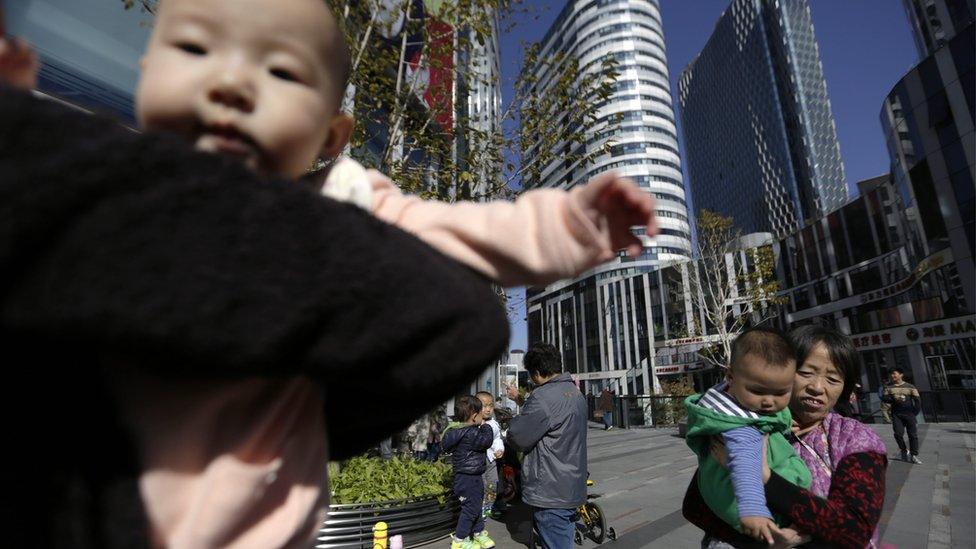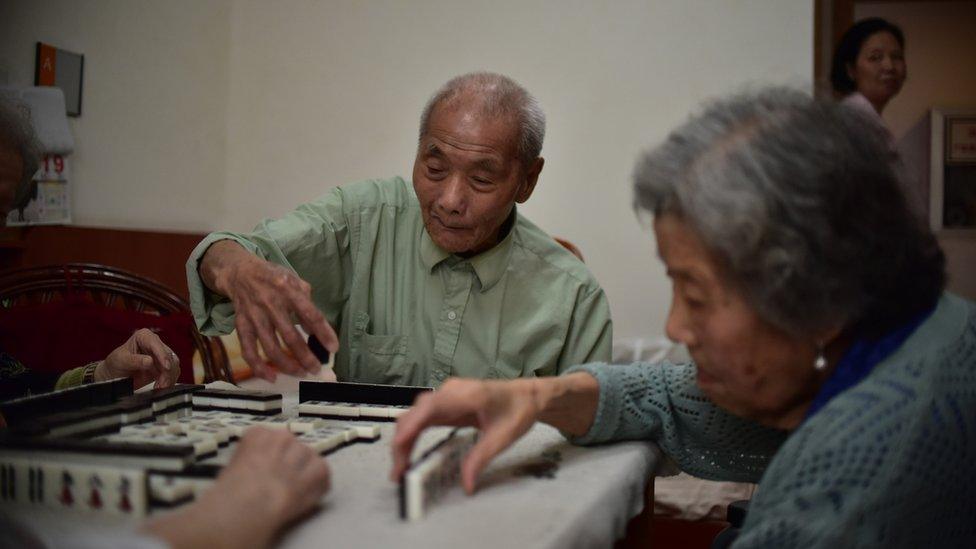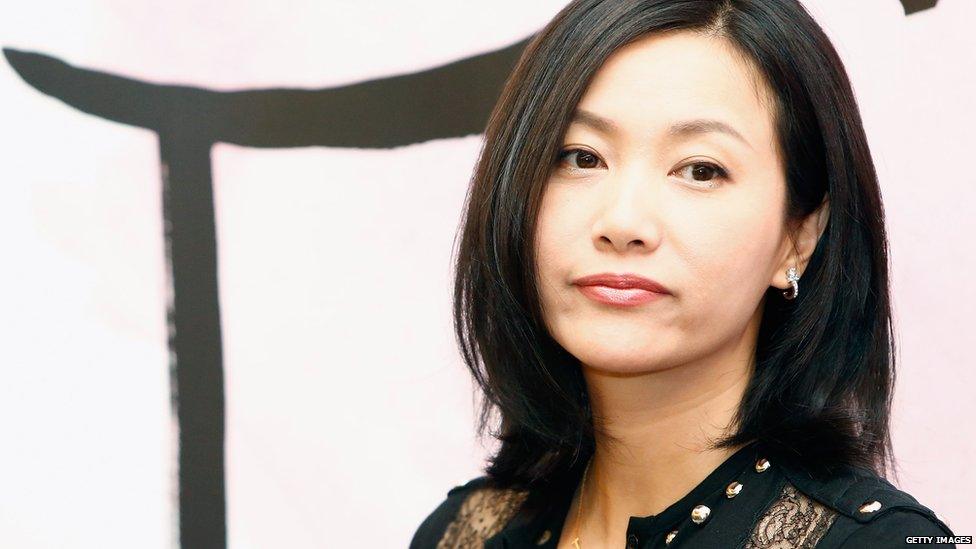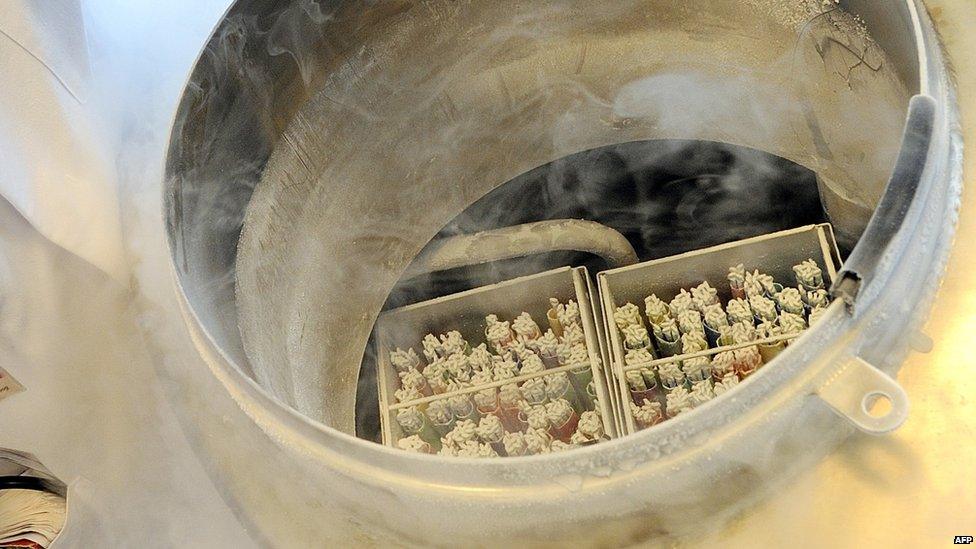China's two-child policy: Single mothers left out
- Published

Many single mothers in China are standing up and voicing out against the new 'two-child policy'
China's announcement that it is ending its decades-long one-child policy is good news for married couples who want to have two children. But if you're an unmarried woman, forget about it, writes author Leta Hong Fincher.
Taboos about single parenthood are eroding in many countries around the world. Sweden, for example, boasts about its generous government subsidies for single parents.
Yet in China, the government makes it virtually impossible for most single women to have a child.

End of China's one-child era

Babies from single Chinese women are denied birth certificates, among other basic benefits
'Deep down we were all bitter': enduring personal cost
Five numbers that sum up China's one-child policy
Model example: the town running out of children
'I was forced to be sterilised': trauma and sympathy shared online

Single women without a valid "reproduction permit" from the government are routinely denied birth certificates for their children.
They will not be given a hukou - the official household registration - and so their child will have trouble gaining admission to school or access to affordable healthcare.
Moreover, if women cannot produce a marriage certificate upon giving birth, they are frequently slapped with a "social maintenance fee" for violating family planning policies.
These fees can be crippling.
'I'm not allowed a child'
The city of Wuhan proposed a draft regulation in June 2013 to impose an unusually heavy fine on single mothers.
Women who had a child out of wedlock would be fined around RMB 80,000 (roughly US$13,000 at the time), or about four times the average annual income in Wuhan.

The Chinese population is rapidly ageing
The proposal sparked such an outcry that the city government backed down, and in December 2013, Hubei province said that it would stop withholding birth certificates from children of single mothers.
But so far, there is no sign that the nationwide loosening of family planning restrictions will extend to single women.
Some of China's single would-be mothers are taking to social media to complain.
On Sina Weibo, the popular micro-blogging site, one woman commented that she would love to have a child without marrying a man, but "I'm not allowed to".
Another posted: "I can't get my reproduction permit, so my child wouldn't have a hukou and I would still have to pay a fine."
One user wrote: "My child would be an 'illicit household' child without any benefits."
Egg freezing controversy
One internet user commented that unless the Chinese government removed heavy penalties on unmarried mothers, "single women with an education and a high income should immigrate to another country".
In fact, some successful, single women have already begun travelling abroad to freeze their eggs. Under current regulations, China bans single women from using assisted reproductive technology.

Debate began after Chinese actress Xu Jinglei flew to the US to freeze her eggs

Freezing one's eggs is illegal in China
In July, one of China's most famous movie stars, Xu Jinglei, 41, told a Chinese magazine that she had flown to the United States to freeze her eggs.
News of Xu's revelation went viral on Weibo and even infamous male blogger, Han Han - notorious for boasting about his womanizing and sexual conquests - came out in support of Xu's choice.
"Isn't it okay to just want a child but not want to marry a man?" he asked, prompting tens of thousands of comments in response.
China ended its one-child policy in the hope that it could alleviate some of its tremendous demographic challenges, which it fears will increasingly drag down economic growth rates.
These population pressures - caused in large part by the imposition of the policy itself in 1980 - include a rapidly aging population, shrinking work force, falling birth rates, and an extreme sex ratio imbalance, with roughly 116 boys born for every 100 girls.
China's official Xinhua state news agency said that China now had 30m more men than women, and many of these men would be unable to ever find brides.
'Patriarchy would crumble'
Given all of China's demographic problems, why doesn't the government simply lift the restrictions on single mothers?
One Weibo user put it succinctly: "The cornerstone of patriarchy would crumble if the state allowed women to give birth outside of marriage."
The penalties for single women who want a child are just one of many state-imposed pressures pushing women into marriage and stigmatising urban, professional women in their mid-twenties or older as "leftover" women.
Many of the women I have spoken with in cities such as Beijing and Shanghai, say they don't want to marry at all, but they are still doing it because they want to have a child and the obstacles for single mothers are virtually insurmountable.

Could the new policy place even more pressure on China's female population?
Rather than giving women increased reproductive freedom, some Chinese feminists warn that the new "two-child policy" may actually put even more pressure on women in new, as yet unforeseen ways, for example, through increased gender discrimination in hiring, as employers factor in the time female job applicants may take off from work to have two babies as opposed to one.
Feminist activist Lü Pin published an essay (in Chinese), external arguing that under the "two-child policy", China's women are still treated as tools for meeting the government's population targets.
She asked: "Is it possible that control over reproductive decisions will move from the patriarchal state to the patriarchal family, that women will move from being forced not to have children to being forced to have children?"
Yet in spite of continuing discrimination, more and more single women are rejecting the state's intrusion into their private lives.
One woman announced on Weibo that she refused to give in to pressure to marry or have a child.
"I'm going to raise two more dogs and a cat," she said.
Leta Hong Fincher is a Hong Kong-based academic and author or Leftover Women: The Resurgence of Gender Inequality in China.